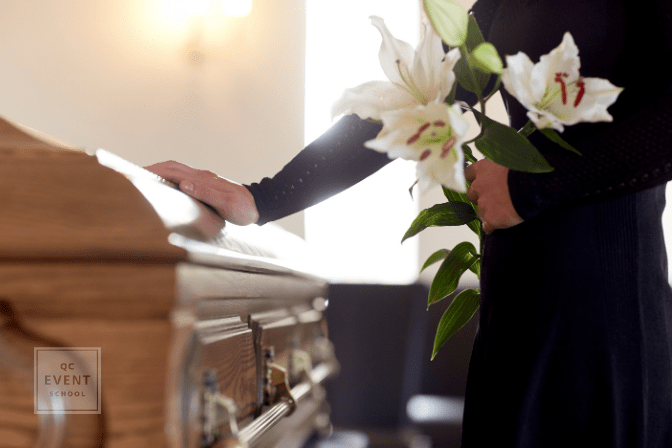
Planning Tips, Your Event Career
Your Event Planning Career: Funeral Services
Losing a loved one is undoubtedly one of the toughest moments in a person’s life. During such an emotionally draining time, not all who are in the midst of grieving are going to want to have to plan a funeral.
Often, this is where one might turn to a funeral planner. That way, a skilled professional can instead be the one responsible for such stressful responsibilities as organizing the memorial, the reception, and the funeral itself.
Unfortunately, not all funeral homes offer this type of assistance. This is where you come in. As part of your event planning career, you can add funeral planning to the ample list of services provided to clients. Your training and expertise can be utilized to help make one of the hardest days of your client’s life a little less difficult.
You can help make a difference!
Of course, organizing a funeral is a very different experience from organizing other kinds of events. Due to the high emotions of all those involved, it’s important that you understand the proper etiquette required. If there is any kind of event where tact, professionalism, and empathy are needed, it’s definitely this one!
Your Role as a Funeral Planner
Not all funerals are going to be the same. The way everything unfolds can be heavily influenced by the family’s culture, religion, personalities, etc. Your role as the planner is to help them put together something that celebrates the life their loved one lived, while also paying respect to the life that’s been lost.
Some of your responsibilities may include:
- Conducting a consultation with your client
- Outlining the budget, and making sure to stay within it
- Working with funeral directors to schedule services
- Booking venues for memorials and/or receptions
- Working with vendors (i.e. florists, caterers, etc.)
- Sourcing and acquiring electronic equipment for the purposes of displaying commemorative slideshows, music, videos, etc.
- Assisting the client (and, if applicable, their family) in selecting caskets, urns, etc.
- Coordinating the publication of obituaries, online and/or in the local paper
- Securing writers to assist the family with speech writing, obituary writing, etc.
- Assisting with any requested decor (such as photos, florals, etc.)
- Helping the client and their family complete, submit, and distribute any necessary paperwork relating to the death
- Arranging to have the deceased individual’s personal belongings recovered (if they previously resided in a hospital, assisted living facility, etc.)
- Providing your client and their family with resources and referrals for grief counseling, if requested
- And much more.
Note: If you struggle with death, this is not the right avenue to take your event planning career. For the sake of your client and their family, they’re going to need you to be a pillar of strength! Only you know for sure whether this is something you’re prepared to handle.
The Client Consultation
In most types of events, the initial consultation is an exciting moment, especially for your client. When it comes to planning for a funeral, this is more often than not the complete opposite. Instead, your client is likely to be emotionally fragile and extremely taxed.
This is why it’s crucial that you understand how to properly conduct this initial consultation. Above all else, remember to be professional, but also understanding. Your client will need someone in their corner, to assist them in getting through this ordeal as effortlessly as possible. You want them to walk away from the consultation knowing that they can trust you to help them.
The sorts of questions you’ll need to ask your client are way too long to list them all. Only with proper training will you have the best idea of what should and shouldn’t be asked during this kind of client consultation.
However, to give you a bit of an idea, here are just some of the major things you’ll need to make sure to discuss:
- Potential legal and financial issues they may not have considered, especially if the passing was unexpected
- Whether or not there is a will
- Whether or not multiple copies of the death certificate have yet been made
- Is there a pre-arranged funeral contract already out into place?
- Has the client (or any members of the family) been in contact with the insurance company, to notify them of the current circumstances?
- Does your client and their family have a lawyer? If so, is the family lawyer aware of the individual’s passing?
- What specific services are they looking to have prepared?
- Do they have a budget in mind?
This is also the time for you to get to know the deceased individual a bit more. Be EXTRA careful when broaching this, as this will undoubtedly be difficult for your client to talk about. However, it’s important that you get a bit of a feel for who this person was, and how their family wants them to be remembered.
This can factor in heavily with the way the event is organized, what kind of event decor is chosen, and how it’s incorporated.
Financing a Funeral
It can feel a bit insensitive and inappropriate to bring up finances when your client is struggling with the passing of a loved one. We get it. Especially in this type of situation, there’s no easy way to raise the topic of finances.
That being said, just like with any event, you want to make sure that your client isn’t taken advantage of. After all, the unfortunate truth is that funerals are often very costly. In fact, the average funeral can run as high as $10,000! Without your expert guidance, their vulnerable state can be manipulated when in the wrong hands.
In order to best provide your client with the services they want, you’re going to need to know what figures you’ll be working with. This way, your client can remove all money stresses from their mind, and you can give them assurance that they’ll be getting the most out of their budget (without the risk of going over it).
Some of the potential costs you’ll likely encounter include:
- Funeral home fees
- Venue fees
- Vendor and supplier fees
- Legal fees
- Fees for cemetery plots, caskets, urns, cremation, headstones, etc.
As an industry professional, it’s your responsibility to understand standard costs within the given local area. Only then can you research to find options that best suit your client and their financial boundaries.
This is where proper training is invaluable! As part of your event planning career, we can’t stress enough how important reputable education and training is. If you have goals of offering funeral planning services, make sure you take a course specializing in this area of the industry. At the very least, an all-encompassing event planning course should teach you about funeral planning as well.
Personal Skills Required
As we mentioned, being a funeral planner requires a high level of empathy and organization. In addition, it’s also helpful for you to also have the following personal skills, too:
- You’re interpersonal
- You’re adaptable
- You can think on your feet, and remain calm in the face of an unexpected emergency
- You have solid business skills, such as possessing a knack for negotiating and seeking out reputable industry professionals
- You’re mentally and emotionally strong
- You’re patient
- You’re motivated
- You’re honest (while also maintaining that professionalism and tact we talked about earlier)
It takes the right kind of person to be a good funeral planner. So long as you always focus on putting your client first, you can be exactly who they need to help get through a tumultuous time.



